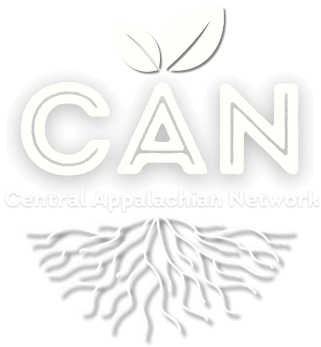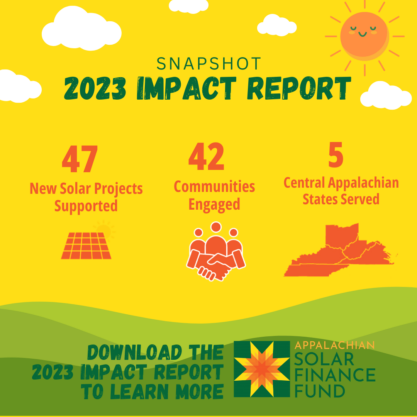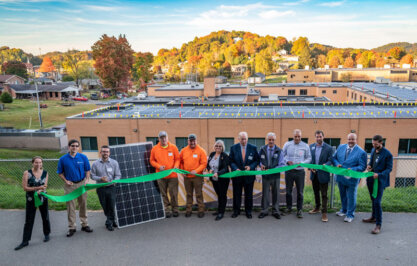Central Appalachia has long been a leader in the nation’s energy economy. With the decline of the coal industry and it’s related jobs and supply chains across the region, we face an urgent need and opportunity to embrace the new energy economy’s potential in Appalachia.
Appalachia’s New Energy Opportunity
Energy efficiency and renewable energy have been repeatedly identified as potential economic leverage points for the region’s transition. The new energy economy is symbolically important as we shift from a fossil-fuel based economy both regionally and nationally. Renewable energy usage and improved energy efficiency will be critical for limiting contributions to climate change. They also present several tangible and short-term economic benefits.
Energy efficiency is commonly described as the low-hanging fruit of the new energy economy, because we already have the technology, expertise, and identified need (or latent demand) to make it work. Appalachian communities are disproportionally affected by energy-inefficient homes and buildings and stand to benefit greatly from expanded retrofitting services. Small and medium-sized businesses in rural communities are disproportionately burdened by crippling energy costs. At the same time, renewable energy, particularly solar energy generation, is well-suited to rural areas that have affordable land, with abandoned mine lands holding particular promise for solar generation and other clean energy installations. Both energy efficiency and renewables hold great potential for business and employment growth, with green collar jobs identified as a fast-growing workforce category. These types of jobs have significant benefits for working class families in the region, as they are well-suited to retraining efforts for workers with experience in manufacturing, mining, and other industries.
Through the Appalachian Solar Finance Fund, Appalachian Voices will partner with the Central Appalachian Network, Partner Community Capital, Invest Appalachia and New Resource Solutions to accelerate solar development and economic growth in the region. The Appalachian Solar Finance Fund is a project to catalyze commercial & institutional solar projects in coal-impacted communities throughout Central Appalachia.
Aligning Clean Energy Strategies
For the region’s clean energy opportunities to be captured, they must first be fully understood and approached with optimal coordination and strategic alignment among actors working in that space. To that end, CAN has focused our efforts in this sector on building peer networks of strong relationships and shared analysis among clean energy practitioners and advocates. These peer networks allow practitioners across the region to develop collective knowledge, analysis, and tools, such as those below.
In 2021, the CAN Clean Energy Working Group produced a policy brief that outlines fifteen policy priorities key to moving forward the clean energy economy in Central Appalachia.
Central Appalachian Network Clean Energy Policy Priorities: Policy Brief
Three reports produced by CAN in 2018 provide a baseline understanding of three key aspects of the emerging clean energy economy: Policy, Economic Impact, and Messaging.
The CAN Clean Energy Working Group focuses its work through 3 committees: Policy & Advocacy, Communications, and Investment. The Policy & Advocacy subcommittee recently dispersed a series of rapid response advocacy mini-grants to organizations in the region with advocacy projects underway. The Communications subcommittee partnered with Piper Communications to create a clean energy communications campaign which lifted up important clean energy stories in the region and placed them in regional news outlets. The Investment committee has been working to create a pipeline of regional, investable clean energy projects.
The members of the CAN clean energy practitioner network include:
- MACED (KY)
- Housing Development Alliance (KY)
- Fahe (KY)
- Rural Action/Upgrade Ohio (OH)
- Solar United Neighbors (OH)
- Coalfield Development Corp. (WV)
- Solar United Neighbors (WV)
- The Nature Conservancy (WV)
- Energy Efficient West Virginia (WV)
- Natural Capital Investment Fund (WV/NC)
- Appalachian Voices (TN/NC/VA)
- TN Advanced Energy Business Council (TN)
Browse Clean Energy Blog Posts, Resources, and Stories
SFF Impact Report
Solar Finance Fund (SFF) had a brilliant year! SFF catalyzes solar development in local communities by providing competitive grant sub-awards, […]
Read More ›Apply for a Bonus 10-20% of DOE Solar Project Funding
Apply for a Bonus 10-20% of DOE Solar Project Funding Low-income communities across Appalachia can apply for a BONUS 10 to […]
Read More ›How to Use SFF Funding For Your School
Build a brighter future for your school and community with solar energy! Adding solar panels to your school building or […]
Read More ›5 Tips to Get Your Roof Solar Ready!
Going solar is cost and energy efficient, but is your roof solar-ready? Commercial solar projects come in many shapes and […]
Read More ›



